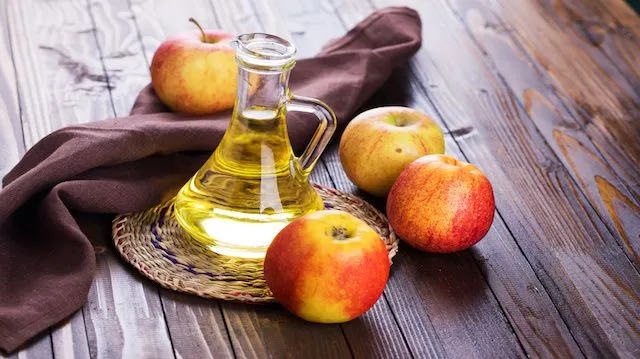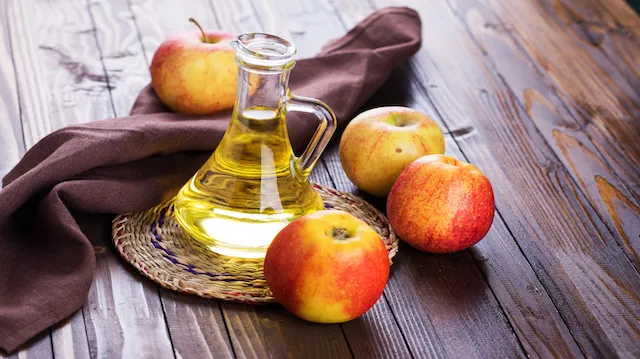
- Share on Facebook159
- Share on Pinterest
- Share on Twitter
A little flaking here and there, some buildup, and maybe a little dullness are all reasons that you might need to start keeping a bottle of apple cider vinegar (ACV) in your bathroom as well as your kitchen. Did you know that apple cider vinegar is incredible for your hair?
Let’s talk about why this super elixir is as good for your hair as it is for your body.
Many people struggle with dry, dull hair, which can be triggered by several factors: hormonal imbalances, yeast overgrowth, and exposure to toxins in the air through daily activities. Hard water can also make hair dry and dull, and lead to a pH imbalance in the scalp.
The scalp needs a mixture of both alkaline and acid to thrive, just like the skin on the rest of the body. However, due to diets high in sugar, refined foods, and junk foods, our hormones can get out of balance. When this occurs, yeast can overgrow in the body — good bacteria dies and unhealthy bacteria thrives.
Symptoms of yeast overgrowth
You’ll notice yeast overgrowth in a few different ways: sugar cravings, low energy, poor mood, erratic hormones, a flaky scalp, dry skin patches, and general itchiness. It tends to come and go, but is usually worse during a workout or in the summer, when the scalp tends to get overheated. This is because yeast thrives in warm, humid environments, which allow it to grow and proliferate.
Though you might not be able to keep from sweating, or keep dry skin at bay completely, there is one way that you can help fight yeast overgrowth internally and externally. The answer is simple, use raw apple cider vinegar!
Why apple cider vinegar is a great tonic for your hair
Apple cider vinegar contains probiotic and prebiotic properties, which promote the growth of good bacteria. These healthy bacterial cultures are formed during the fermentation process of turning apples into vinegar. As the vinegar forms, good bacteria start to grow. You’ll see these cultures in the bottom of a bottle of apple cider vinegar — they appear as cloudy strings that are darker in color than the rest of the vinegar. This is known as the “mother,” which refers to the yeast-like culture which activates the fermentation process. Though it might sound scary, this is what you want!
Don’t buy heated forms of vinegar which contain no bacterial benefits to fight yeast overgrowth on the scalp. Always look for raw and organic apple cider vinegar with the “mother” intact.
Once you have the right type of vinegar, you’ll want to wash your hair in it at least once a week. Why wash your hair in it and not just take it internally, you ask? Here are five reasons that rinsing your hair with some good old ACV is a great idea!
It cleanses the scalp of buildup
One reason that yeast overgrowth on the scalp tends to occur is because of a buildup of bacteria and waste from the chemical hair products, gels, creams, and hairsprays that often go on our hair. Over time, this can cause the scalp to have problems “breathing,” because air is unable to circulate.
Apple cider vinegar doesn’t foam up like shampoo. Instead, it strips away bacteria and removes all the buildup that can help yeast to thrive and grow.
It adds good bacteria back to the scalp
When you strip your hair of buildup and bacteria, it’s also important to consider what you’re doing to the pH of your scalp at the same time. Many conventional products work to strip away buildup, but those with chemicals also damage the precious pH of the scalp, which is needed for ultimate protection. This is why commercial products are not a good idea for removing buildup.
Apple cider vinegar, on the other hand, actually normalizes the pH of the scalp and adds good bacteria to help protect your hair.
It adds shine to your hair
Apple cider vinegar also adds a lovely shine to your hair. It does this by removing dullness and dryness while also providing high-quality nutrients to enhance the look of your strands.
It isn’t harsh
Unlike abrasive chemical rinses or shine products, apple cider vinegar is very gentle on your hair. And, although it has a strong odor, it contains no damaging chemicals.
Many hair products smell nice but are filled with toxic chemicals that may weaken your immunity and wreak havoc on your microbiome, the body’s natural bacterial balance.
It strengthens your hair
Apple cider vinegar is full of B vitamins that strengthen your hair, help it to grow, and also make it less prone to breakage and damage over time.
How to use apple cider vinegar on your hair
 To start, you’ll want to pour about one cup of apple cider vinegar onto your head, after wetting it and before shampooing. Pour it on the top and let it go down the rest of your hair. Then, let it sit while you wash your body and face. Next, shampoo with your favorite organic or homemade shampoo.
To start, you’ll want to pour about one cup of apple cider vinegar onto your head, after wetting it and before shampooing. Pour it on the top and let it go down the rest of your hair. Then, let it sit while you wash your body and face. Next, shampoo with your favorite organic or homemade shampoo.
Condition as normal (with an organic or homemade conditioner that is free of harmful chemicals), and you’re done — simple as that!
Taking apple cider vinegar internally is another fantastic way to fight yeast overgrowth. However, if you regularly experience buildup on your scalp, using it externally can help a lot as well. This miracle elixir is a great addition to your cleansing routine!
How else do you use apple cider vinegar?
—Heather McClees
Heather McClees is a professional health journalist and Certified Holistic Nutritionist from South Carolina.She received her B.S. Degree in Nutrition Science and Dietetics, and is most passionate about helping others discover the gift of of holistic health, showing others how to create healthy recipes based on their favorite foods, physical fitness and yoga, and creative writing.
Sources:
http://bodyecology.com/articles/apple_cider_vinegar.php
http://articles.mercola.com/sites/articles/archive/2009/06/02/apple-cider-vinegar-hype.aspx
http://www.rd.com/slideshows/dandruff-natural-treatment
http://www.drweil.com/drw/u/ART03502/Yeast-Infections.html
http://www.doctoroz.com/article/kitchen-cures-your-doctor-can-not-live-without
http://www.earthclinic.com/cures/scalp_infections.html
http://foodmatters.tv/articles-1/how-to-overcome-candida-naturally
- Share on Facebook159
- Share on Pinterest
- Share on Twitter

